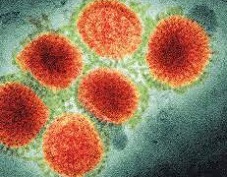BREAKING! Chinese Scientists Discover That The Human Protein ARIH1 Is A Potential Antiviral Against Influenza A Virus!
Influenza A Virus - ARIH1 - Antiviral Apr 03, 2023 2 years, 10 months, 2 days, 14 hours, 7 minutes ago
Influenza A virus is a notorious pathogen that causes severe respiratory infections in humans and animals across the globe. As the world grapples with the ongoing COVID-19 pandemic and also with a potential H5N1 and other flu pandemics in the horizon, understanding the host immune response to
influenza A virus infection is of critical importance.

The human immune system comprises of two branches, innate and adaptive immunity. Innate immunity serves as the first line of defense against infections, while adaptive immunity provides long-lasting, targeted protection. In the fight against viruses, the production of type I interferon plays a crucial role in activating the immune defense system and limiting viral replication.
The Exciting Discovery: ARIH1 in Antiviral Immunity
Scientists from Zunyi Medical University, China, have identified a novel protein, Ariadne-1 homolog (ARIH1), which can enhance the immune response against influenza A virus.
ARIH1 belongs to the E3 ubiquitin ligases family, known for their involvement in various biological processes such as tumorigenesis, cell development, and metabolism.
The study findings were the first to demonstrate the potential antiviral activity of ARIH1 especially against the Influenza A virus.
The study findings showed that the expression of ARIH1 increased during influenza A virus infection, resulting in a reduction of viral replication. This effect was observed to be independent of the virus's life cycle, indicating that ARIH1 may boost host antiviral mechanisms.
The study team discovered that ARIH1 enhances the production of type I interferon and its downstream gene expression by modulating the degradation of retinoic acid-inducible gene-I (RIG-I), a key component of antiviral immunity, through the SQSTM1/p62 signaling pathway.
Deciphering the Mechanism: How ARIH1 Enhances Immune Response
In order to better understand the role of ARIH1 in the immune response against influenza A virus, the study team investigated its impact on various stages of the RIG-I signaling pathway. They found that ARIH1 targets RIG-I and positively regulates the activation of interferon-β signaling. Importantly, they also discovered that ARIH1 does not directly interact with RIG-I but rather influences its activation by regulating the SQSTM1/p62 pathway.
Further investigations revealed that ARIH1 promotes RIG-I expression and antagonizes the degradation of RIG-I induced by SQSTM1/p62. ARIH1 achieves this by interacting with SQSTM1 and blocking its binding to RIG-I. In this way, ARIH1 contributes to the activation of interferon-β signaling and enhances the host's antiviral response.
Conclusion and Future Perspectives
This groundbreaking study uncovers a previously unknown mechanism through which host proteins, such as ARIH1, can enhance antiviral innate immunity by regulating the RIG-I signaling pathway. By inhibiting the degradation of RIG-I and promoting interferon-β signaling, ARIH1 acts as a positive regulator in the host's defense against influenza A virus infection.
This discovery opens new aven
ues for research into the role of ARIH1 in antiviral immunity, with potential implications for the development of novel therapies against influenza and other viral infections. Further studies are needed to fully understand the mechanism by which ARIH1, as an autophagy-related protein, regulates SQSTM1 and the broader implications of this interaction for antiviral immunity.
The study findings were published in the peer reviewed Virology Journal.
https://virologyj.biomedcentral.com/articles/10.1186/s12985-023-02022-1
Thailand
Medical News will be providing a follow up article in coming days as to how certain phytochemicals from certain herbs can be used to safely upregulate ARIH1 especially during times of a influenza A virus or an H5N1 Avian flu outbreak.
For the latest on
Influenza A Virus Research, keep on logging to Thailand
Medical News.
